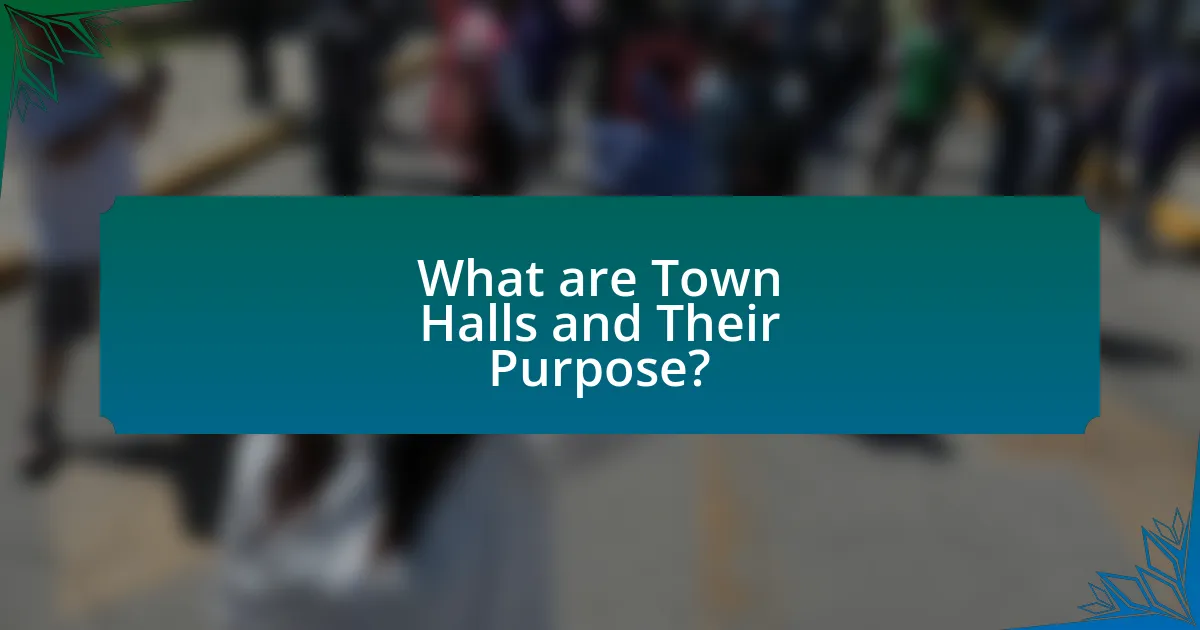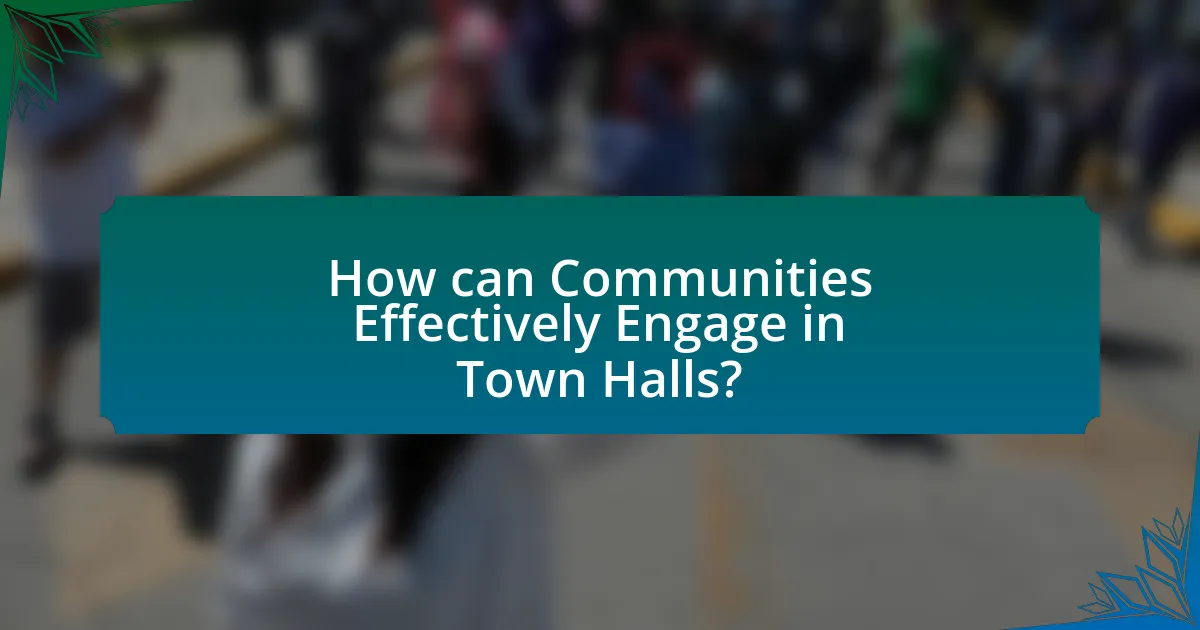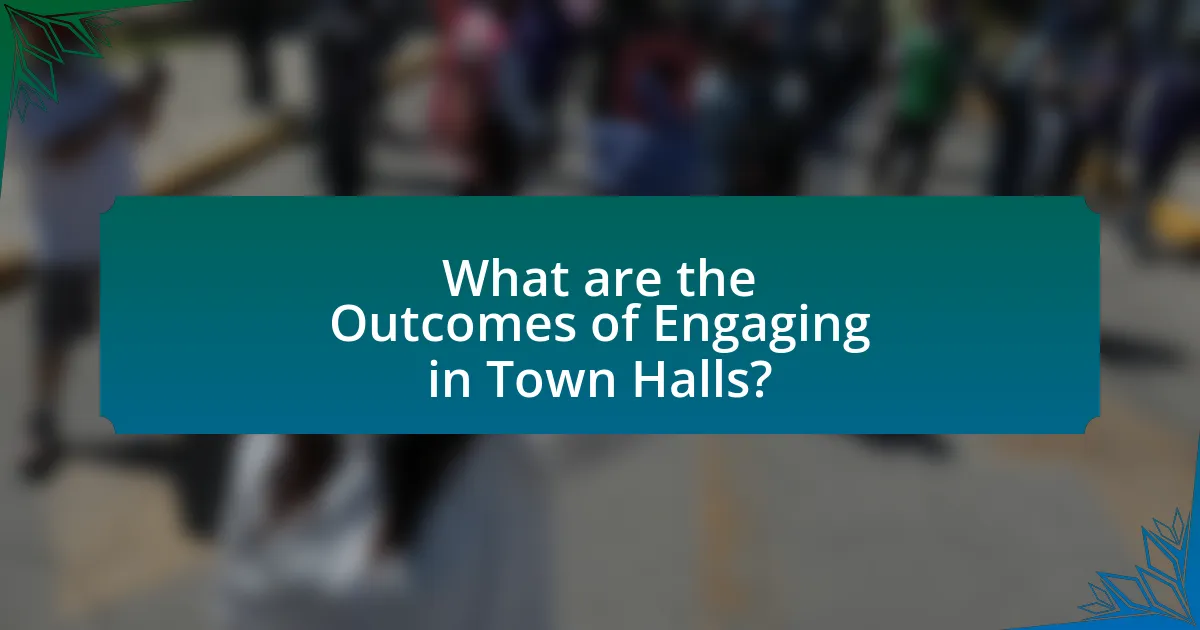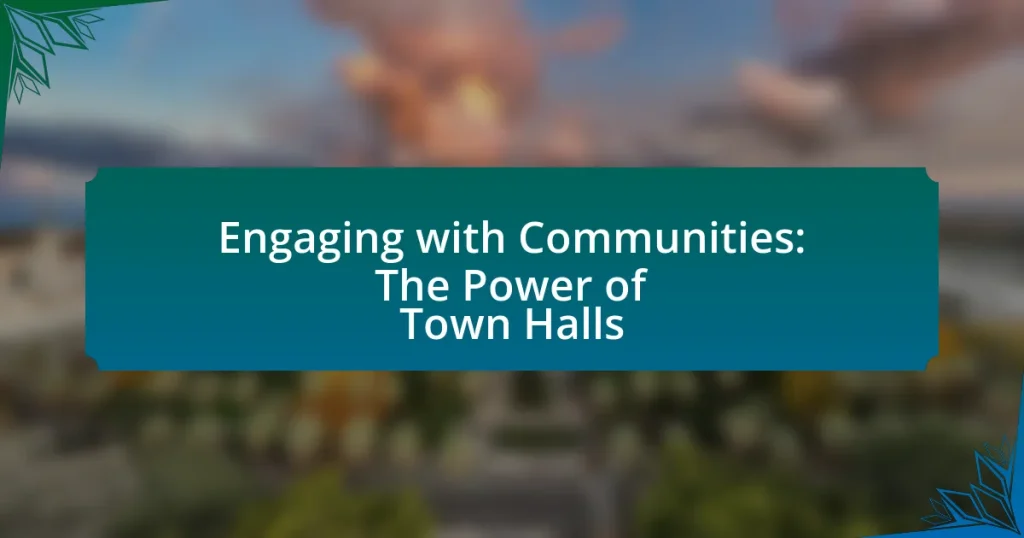Town halls are public meetings designed to foster communication between community members and local government officials, promoting civic engagement and transparency. This article explores the purpose of town halls, their role in facilitating community engagement, and the key elements that contribute to successful meetings. It also examines the differences between town halls and other community meetings, the importance of these gatherings for local governance, and strategies to enhance participation. Additionally, the article addresses common challenges and misconceptions that hinder engagement, while highlighting the positive outcomes of active participation in town halls, including increased trust in local government and actionable community change.

What are Town Halls and Their Purpose?
Town halls are public meetings where community members gather to discuss issues, share information, and engage with local government representatives. Their primary purpose is to facilitate open communication between citizens and officials, allowing for the exchange of ideas, concerns, and feedback on community matters. Historically, town halls have served as a platform for civic engagement, promoting transparency and accountability in governance, as evidenced by their use in various democratic societies since the 17th century.
How do Town Halls facilitate community engagement?
Town Halls facilitate community engagement by providing a structured platform for residents to voice their concerns, share ideas, and participate in local governance. These gatherings encourage direct interaction between community members and local officials, fostering transparency and accountability. Research indicates that communities with regular Town Hall meetings report higher levels of civic participation and satisfaction with local governance, as these forums allow for real-time feedback and collaborative problem-solving. For instance, a study by the National Civic League found that municipalities that implemented regular Town Halls saw a 30% increase in citizen engagement metrics, demonstrating their effectiveness in enhancing community involvement.
What are the key elements of a successful Town Hall meeting?
The key elements of a successful Town Hall meeting include clear communication, active participation, and effective facilitation. Clear communication ensures that the agenda and objectives are well-defined, allowing attendees to understand the purpose of the meeting. Active participation encourages community members to voice their opinions and ask questions, fostering a sense of inclusion and engagement. Effective facilitation involves guiding the discussion, managing time, and ensuring that all voices are heard, which is crucial for maintaining order and focus during the meeting. These elements collectively contribute to a productive and meaningful Town Hall experience, as evidenced by studies showing that well-structured meetings lead to higher community satisfaction and involvement.
How do Town Halls differ from other forms of community meetings?
Town Halls differ from other forms of community meetings primarily in their structure and purpose, as they are designed to facilitate direct dialogue between community members and local government officials. Unlike standard community meetings, which may focus on specific topics or issues, Town Halls typically encourage open discussions, allowing residents to voice concerns, ask questions, and receive immediate feedback from decision-makers. This format fosters transparency and civic engagement, as evidenced by studies showing that communities with regular Town Halls report higher levels of public participation in local governance.
Why are Town Halls important for local governance?
Town Halls are important for local governance because they facilitate direct communication between government officials and community members. This engagement allows residents to voice their concerns, ask questions, and provide feedback on local issues, fostering transparency and accountability in decision-making processes. Research indicates that communities with regular Town Hall meetings experience higher levels of civic participation and trust in local government, as these forums empower citizens to influence policies that affect their lives. For instance, a study by the National Civic League found that municipalities that prioritize public engagement through Town Halls see improved community satisfaction and collaboration in governance.
How do Town Halls promote transparency in government?
Town Halls promote transparency in government by facilitating direct communication between officials and citizens. These meetings allow community members to ask questions, express concerns, and receive information about government actions and policies. For instance, a study by the International City/County Management Association found that 70% of local governments use Town Halls to enhance public engagement and accountability. This direct interaction fosters an environment where citizens can hold their representatives accountable, thereby increasing trust in governmental processes.
What role do Town Halls play in decision-making processes?
Town Halls serve as a crucial platform for community engagement in decision-making processes. They facilitate direct communication between local government officials and residents, allowing citizens to voice their opinions, concerns, and suggestions on various issues. This participatory approach enhances transparency and accountability in governance, as evidenced by studies showing that communities with active Town Hall meetings report higher levels of civic engagement and satisfaction with local government actions. Furthermore, Town Halls often influence policy decisions by providing elected officials with firsthand insights into the needs and priorities of their constituents, thereby shaping more responsive and effective governance.

How can Communities Effectively Engage in Town Halls?
Communities can effectively engage in town halls by actively participating in discussions, providing feedback, and collaborating with local officials. Active participation includes attending meetings, asking questions, and voicing concerns, which fosters a sense of ownership and accountability. Providing feedback through surveys or comment periods allows community members to express their views on local issues, ensuring that diverse perspectives are considered. Collaboration with local officials can be enhanced by forming advisory committees or working groups that represent various community interests, thereby creating a more inclusive decision-making process. Research indicates that communities with higher engagement levels in town halls report increased satisfaction with local governance and improved community outcomes.
What strategies can communities use to increase participation in Town Halls?
Communities can increase participation in Town Halls by implementing targeted outreach strategies, such as utilizing social media platforms, distributing flyers, and engaging local organizations. Research indicates that communities that actively promote events through multiple channels see a significant rise in attendance; for example, a study by the National League of Cities found that cities using social media for event promotion experienced a 30% increase in participation. Additionally, offering incentives like refreshments or childcare can further encourage attendance, as these measures address common barriers to participation.
How can social media enhance engagement for Town Hall meetings?
Social media can enhance engagement for Town Hall meetings by providing a platform for real-time interaction and feedback. This allows community members to voice their opinions, ask questions, and participate in discussions before, during, and after the meetings. According to a study by the Pew Research Center, 69% of adults in the U.S. use social media, which indicates a significant potential audience for Town Hall engagement. Additionally, social media can facilitate broader outreach, enabling organizers to share meeting details, updates, and relevant content, thus increasing attendance and participation.
What are effective ways to promote Town Hall events?
Effective ways to promote Town Hall events include utilizing social media platforms, distributing flyers in community centers, and engaging local media outlets. Social media allows for targeted outreach, enabling organizers to reach specific demographics and encourage sharing among community members. Distributing flyers in high-traffic areas ensures visibility and can attract attendees who may not be active online. Engaging local media outlets, such as newspapers and radio stations, can amplify the event’s reach, as these platforms often have established trust within the community. According to a study by the Pew Research Center, 69% of adults in the U.S. use social media, highlighting its effectiveness as a promotional tool.
What challenges do communities face in Town Hall participation?
Communities face several challenges in Town Hall participation, including lack of awareness, accessibility issues, and distrust in local government. Lack of awareness often stems from insufficient outreach and communication strategies, leading to low attendance. Accessibility issues can arise from physical barriers, such as location and transportation, as well as scheduling conflicts that prevent residents from attending. Distrust in local government can discourage participation, as individuals may feel their voices will not be heard or valued. According to a study by the International City/County Management Association, 60% of residents reported feeling disconnected from local government, highlighting the need for improved engagement strategies.
How can communities overcome barriers to participation?
Communities can overcome barriers to participation by implementing inclusive outreach strategies that actively engage diverse populations. For instance, utilizing multiple communication channels such as social media, community flyers, and local radio can ensure that information reaches various demographics, including those who may not have access to traditional media. Research indicates that communities that employ targeted outreach efforts see a 30% increase in participation rates, as evidenced by a study conducted by the National Civic League in 2020. Additionally, providing accessible venues and resources, such as transportation assistance and language translation services, further facilitates participation among underrepresented groups.
What are common misconceptions about Town Halls that hinder engagement?
Common misconceptions about Town Halls that hinder engagement include the belief that they are only for political elites, that they lack real impact, and that they are unwelcoming to diverse voices. Many individuals perceive Town Halls as exclusive events dominated by politicians and insiders, which discourages broader community participation. Additionally, some community members think that their input will not lead to tangible changes, leading to apathy and disengagement. Furthermore, the perception that Town Halls are not designed for diverse perspectives can alienate underrepresented groups, reducing overall attendance and participation. These misconceptions collectively create barriers to effective community engagement and limit the potential benefits of Town Halls as platforms for dialogue and collaboration.

What are the Outcomes of Engaging in Town Halls?
Engaging in town halls leads to increased community participation and enhanced communication between citizens and local government. This interaction fosters transparency, allowing residents to voice concerns and influence decision-making processes. Research indicates that communities with active town hall meetings report higher levels of civic engagement and trust in local authorities, as evidenced by a study from the International City/County Management Association, which found that 70% of participants felt more informed about local issues after attending such meetings. Additionally, town halls can serve as platforms for collaborative problem-solving, enabling diverse perspectives to shape community initiatives.
How do Town Halls impact community relationships?
Town Halls significantly enhance community relationships by fostering open communication between local government and residents. These gatherings provide a platform for citizens to voice concerns, share ideas, and engage directly with elected officials, thereby promoting transparency and accountability. Research indicates that communities with regular Town Hall meetings report higher levels of civic engagement and trust in local government, as evidenced by a study from the International City/County Management Association, which found that 75% of participants felt more connected to their community after attending such events. This interaction not only strengthens community bonds but also encourages collaborative problem-solving, leading to more effective governance and a greater sense of belonging among residents.
What benefits do residents gain from participating in Town Halls?
Residents gain several benefits from participating in Town Halls, including increased civic engagement, direct communication with local officials, and the opportunity to influence community decisions. By attending these meetings, residents can voice their concerns, ask questions, and provide input on local issues, which fosters a sense of community involvement. Research indicates that communities with active Town Hall participation often experience higher levels of trust in local government and improved public services, as officials are more attuned to the needs and preferences of their constituents.
How can Town Halls lead to actionable change in the community?
Town Halls can lead to actionable change in the community by facilitating direct communication between residents and local leaders, allowing for the identification of community needs and priorities. This engagement fosters a sense of ownership among community members, encouraging them to participate in decision-making processes. For instance, a study by the National Civic League found that communities with regular Town Hall meetings reported higher levels of civic engagement and satisfaction with local governance. By providing a platform for dialogue, Town Halls enable the collection of diverse perspectives, which can inform policy decisions and initiatives that address specific community issues, ultimately driving tangible improvements in local quality of life.
What are best practices for conducting effective Town Halls?
Best practices for conducting effective Town Halls include clear communication, active engagement, and structured agendas. Clear communication ensures that all participants understand the purpose and topics of discussion, which can be achieved by sharing information in advance through emails or community bulletins. Active engagement involves encouraging participation from attendees, which can be facilitated by using interactive tools like polls or Q&A sessions. Structured agendas help keep the meeting focused and on track, allowing for a productive dialogue. Research indicates that Town Halls with these elements lead to higher satisfaction rates among participants, as they feel their voices are heard and valued.
How can facilitators ensure all voices are heard during Town Halls?
Facilitators can ensure all voices are heard during Town Halls by implementing structured participation methods, such as using a speaking queue or small group discussions. These methods allow for equitable opportunities to contribute, reducing the dominance of louder voices. Research indicates that structured formats can increase participation rates by up to 30%, as they create a more inclusive environment where individuals feel comfortable sharing their perspectives. Additionally, facilitators can utilize anonymous feedback tools, which have been shown to encourage input from those who may be hesitant to speak publicly, further ensuring diverse viewpoints are represented.
What follow-up actions should be taken after a Town Hall meeting?
After a Town Hall meeting, the primary follow-up action is to distribute a summary of the meeting’s key points and decisions to all participants. This ensures transparency and keeps the community informed about the outcomes and next steps. Additionally, gathering feedback from attendees through surveys or direct communication helps assess the effectiveness of the meeting and identify areas for improvement. Implementing any actionable items discussed during the meeting is crucial for demonstrating responsiveness to community concerns. According to a study by the International Association for Public Participation, effective follow-up actions significantly enhance community trust and engagement, reinforcing the importance of these steps.
What tips can enhance the effectiveness of Town Halls?
To enhance the effectiveness of Town Halls, organizers should prioritize clear communication, active participation, and follow-up actions. Clear communication ensures that the agenda is well-defined and shared in advance, allowing attendees to prepare and engage meaningfully. Active participation can be encouraged through interactive formats, such as Q&A sessions or breakout discussions, which foster dialogue and community involvement. Follow-up actions, including summarizing key points and outlining next steps, demonstrate accountability and keep the community informed about how their input is being utilized. These strategies are supported by research indicating that effective communication and engagement significantly improve community trust and participation in local governance.


